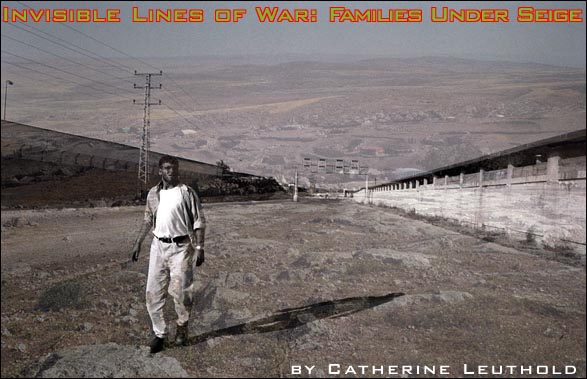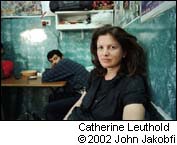
|
||
|
The Invisible
Lines of War: Families Under Siege
“On September 11, the lines of war blurred,” said Leuthold. “This new war shattered families in America in a way that was no longer in some distant land.” Leuthold was troubled, not only by what was happening in her own city, but also by what was happening to families under siege in Israel, a land where religious zealotry and political fanaticism seemed to breed terrorism and oppression seemed to breed contempt. “I needed to see for myself, this region where there is so much pain, anger, and bloodshed,” said Leuthold. She was searching for a perspective about why young Palestinian men and women would strap bombs to their bodies and blow themselves up in a crowded marketplace, or what would prompt Israeli teenagers to carry machine guns around on a Saturday night outing. “I needed to try and understand the hatred that could breed terrorists of the sort who attacked our cities last September.” Whether it was true or not, Leuthold did not know, but the violence here, she felt, seemed to be related to the violence there. Leuthold arrived in Israel on April 12, on the first of two extended visits, as Palestinian suicide bombers continued to cause death and destruction, and Ariel Sharon had begun Operation Defensive Shield, occupying and destroying many homes and businesses on the West Bank, in retaliation. She said she wanted to give a face and a voice to Palestinian families, and an incident in Tel Aviv airport proved pivotal to the evolution of her story. While officials hand-checked her film, a Palestinian-American family in a line nearby had been detained by passport control. Pleading with officials, family members pointed out that they had been there since 10am. Now well past 5, officials were screening their luggage yet another time as their possessions tumbled out and fell to the floor. “As the Palestinian family continued to plead with security, the father caught my eye,” Leuthold said. “And then…I saw his daughter’s eyes fill with anger. As security allowed me, and others, to pass, while continuing to detain the family, I began to understand something of the humiliation that this family must be feeling. It was the beginning of a story on the small indignities, the small daily humiliations that the Palestinian people endure under occupation. It was the beginning, for me, of a more profound understanding of Palestinian pride and determination to protect and defend their way of life; which is threatened with cement barriers, curfews, barbed wire and land reapportionment, creating a sense of futility, dread, chaos and instability.” Leuthold’s compelling images depict families who have been caught in the crossfire between Palestinian insurgency and Sharon’s hard line politics. One need only look at the photograph of Lila and Joseph Kahil as they survey the damage done to their home in Bethlehem by Israeli soldiers…or the damage done to Marwan and Etaf Shaaban’s home by Israeli helicopter gunships in Nablus, to feel their helplessness. To look at the body language in the photograph of the woman arguing with an Israeli soldier as she passes through Kalandia checkpoint on the first day curfew has been lifted in Ramallah, one senses her humiliation and anger. When young Muslims, denied access to their mosque in Jerusalem, pray instead, outside Damascus gate, while an Israeli soldier stands guard… the tension is palpable. But while Leuthold’s images poignantly convey some of the indignities and hardships of refugee families, one of her photographs makes a particularly salient point and raises troubling questions about the long record of Palestinian anti-Israeli sentiment regarding Israel’s own existence. In Jabaliya refugee camp, a father and son pass in front of a wall with anti-Israeli graffiti, a dagger thrust into a Star of David. And in what is perhaps the most chilling image of all, a young boy at the Belata refugee camp cemetery, holds a toy gun in his mouth as a joke. For Leuthold, there are no clear-cut answers: “Terrorism cannot be condoned, no matter the circumstances,” she says, “but all Palestinians are not terrorists.” The families that I photographed are individuals with names and faces. The battle lines are less clearly defined when you see their faces and hear their stories.” Leuthold’s powerful images suggest that while Palestinian families are fighting for a way of life, the one thing that resonates loudly is that there is still no peace. |
Enter Catherine Leuthold's Photo Gallery
|
Write a Letter
to the Editor |
 Catherine
Leuthold, by her own definition, is not a war photographer. But on
September 11, the ground beneath her shifted literally and figuratively,
as she was caught up in the enormous physical and emotional vortex
of the terrorist attacks in New York City. Her images of the rescue
efforts in the aftermath of the collapse of the World Trade Center,
are among those embedded in our national psyche. But for Leuthold,
a compassionate and dedicated photojournalist, that day raised questions
about what she was doing as a journalist, and what was going on in
a world where some of its citizens harbor terrible ill-will toward
one another.
Catherine
Leuthold, by her own definition, is not a war photographer. But on
September 11, the ground beneath her shifted literally and figuratively,
as she was caught up in the enormous physical and emotional vortex
of the terrorist attacks in New York City. Her images of the rescue
efforts in the aftermath of the collapse of the World Trade Center,
are among those embedded in our national psyche. But for Leuthold,
a compassionate and dedicated photojournalist, that day raised questions
about what she was doing as a journalist, and what was going on in
a world where some of its citizens harbor terrible ill-will toward
one another.